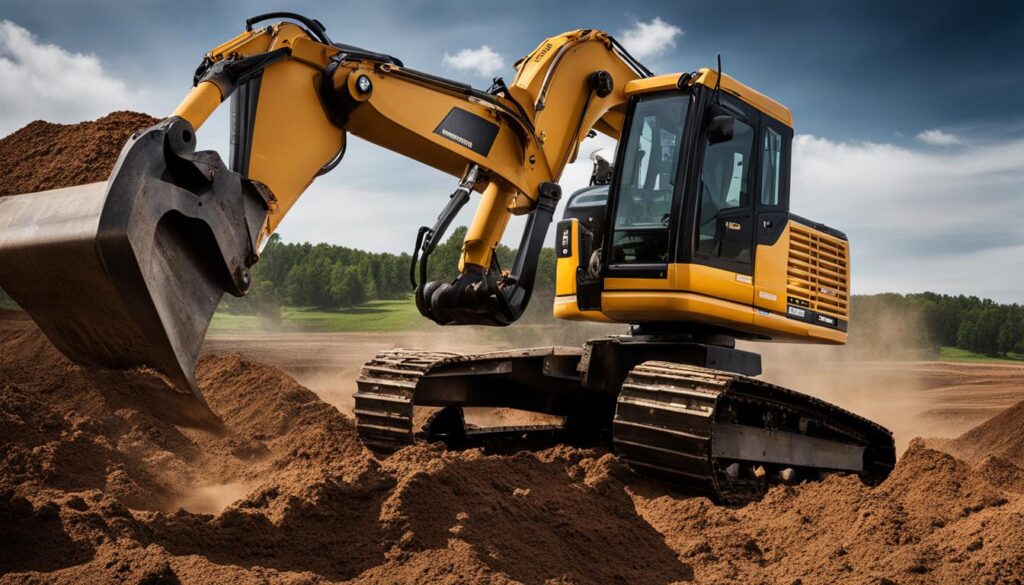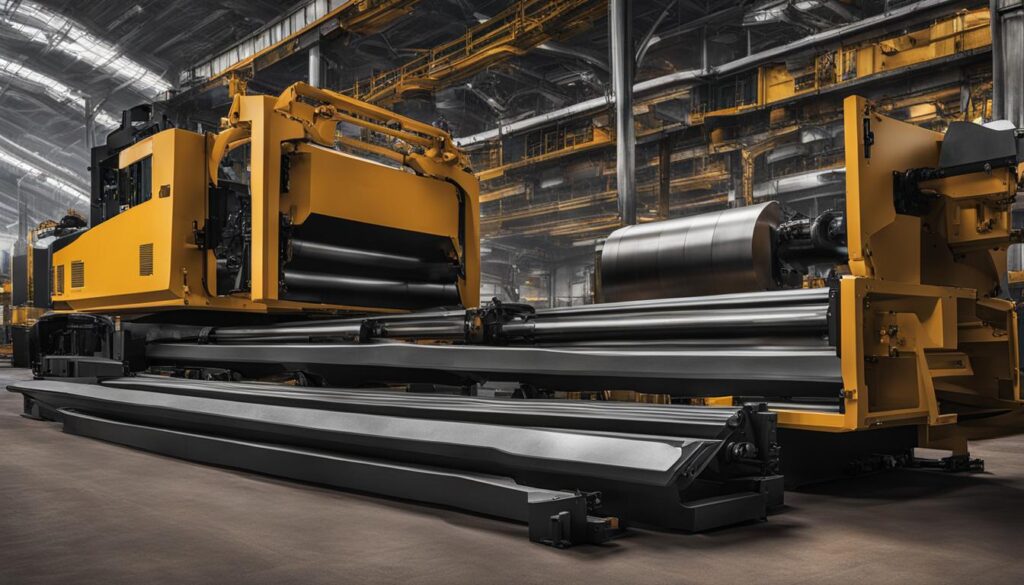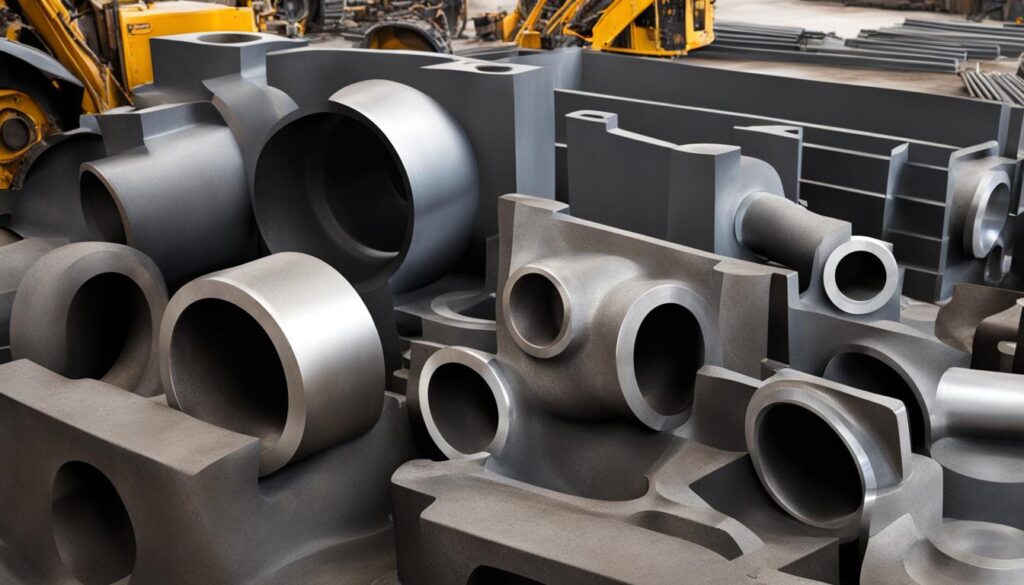At KT-Foundry, we understand the significance of alloy steel castings in the construction machinery sector. Approximately 50% of the 1.808 billion tons of crude steel produced worldwide is designated for construction, underscoring steel’s role in modern industry. Alloy steel, in particular, offers a range of properties achievable through the inclusion of metals like chromium, manganese, and others. The versatility of alloy steels with varying compositions allows for their use in different forms such as pipes, tubes, bars, and plates, contributing to the support of large structures and the manufacturing of flanges and coils. Prices for alloy steel can fluctuate depending on factors such as composition and size, with the china market pricing ranging from $1,294 to $5,839 per ton.
Key Takeaways
- Alloy steel castings are incredibly important in the construction machinery sector.
- Approximately half of the world’s crude steel production is designated for construction, emphasizing the material’s significance.
- Alloy steel properties can be manipulated through the inclusion of metals like chromium and manganese, providing a versatile material for various applications.
- Alloy steel can be made into pipes, tubes, bars, and plates, essential components within construction machinery and large structures.
- Prices for alloy steel can vary based on composition and size, with a wide range of market pricing.
Understanding Alloy Steels and Their Significance in Construction
Alloy steel castings from KT-Foundry are integral to construction due to their enhanced properties derived from intentional element additions to carbon steel. These alloys form a diverse family of metals with tailored attributes crucial for specific construction demands. The ratio of these added elements defines the mechanical characteristics and categorizes the steel as either low alloy (up to 8% alloying elements) or high alloy (more than 8% alloying elements).
Defining Alloy Steel
At its core, alloy steel is a blend of iron, carbon, and various elements engineered to influence particular attributes such as strength, hardness, or corrosion resistance. The versatility of alloy steel allows it to meet diverse construction requirements, especially when it comes to KT-Foundry steel products. From different types of alloy steel to substrate-specific compositions, we deliver a vast range of specialized steels suitable for every construction project.
The Evolution of Steel in Construction
Steel has evolved significantly over the past two centuries, with modern steel developments accounting for about 75% of new steel types in the last 20 years. Alloy steel advancements continually redefine the construction industry landscape. Our company constantly explores new compositions and treatments to ensure our alloy steel castings stay at the forefront of this progress. Utilizing innovation and cutting-edge technology, we continuously fine-tune and adapt our products to fulfill every construction need.
Grades of Steel and Their Unique Properties
There exist around 3,500 different steel grades, each finely tuned at KT-Foundry to present unique environmental, chemical, and physical properties suited for specialized construction roles. These grades reflect a myriad of applications, including the provision of high performance, corrosion resistance, and structural strength critical in building large structures, reinforcing concrete, or producing weather-resistant bridges.
In modern construction, selecting the correct alloy steel grade is vital for ensuring efficiency, durability, and safety in every project.
Below, we outline the most common steel grades used in the construction industry:
| Steel Grade | Characteristics | Typical Applications |
|---|---|---|
| A36 | High strength and easy weldability | Structural support, beams, and columns |
| A572 | Greater strength-to-weight ratio | Building large structures and supporting weight reduction |
| A1 | High carbon content for hardness and abrasion resistance | Tool production and cutting implements |
| Weathering Steel | Excellent corrosion resistance | Weather-resistant infrastructure, especially bridges |
At KT-Foundry, our commitment to offering premium alloy steel castings means that no matter the construction requirement, we have the materials and expertise to deliver the most suitable product for every project.
Properties of Alloy Steel That Benefit Construction Equipment

Alloy steel castings from KT-Foundry deliver enhanced strength and durability essential for heavy-duty construction machinery. These properties stem from precise adjustments in the alloy composition, such as the addition of manganese and chromium, to provide exceptional longevity and withstand high stress in strenuous construction applications.
Enhanced Strength and Durability
Through the strategic utilization of high-strength alloy steel, we provide durable construction materials that cater to the most demanding construction projects. The KT-Foundry alloy advantages offer superior mechanical qualities like tensile strength, ductility, and toughness, ensuring that steel components demonstrate reliable performance under significant weight and pressure.
| Property | Benefit |
|---|---|
| High strength-to-weight ratio | Allows for lighter construction materials while maintaining structural integrity and reliability |
| Increased modulus of elasticity | Enhances resilience, allowing materials to recover shape after experiencing stress |
| Superior ductility | Reduces the likelihood of sudden failure due to an increased capacity for deformation and energy absorption. |
Corrosion and Wear Resistance
“Our KT-Foundry alloy steel exhibits superior corrosion and wear resistance, thanks to the presence of elements like nickel, chromium, and copper.”
These attributes extend the life of construction machinery by reducing vulnerability to environmental factors and continuous use, thereby limiting maintenance needs and improving reliability. As a result, construction steel longevity is considerably improved, ensuring profitability and efficiency in various construction projects.
- Corrosion-resistant alloy steel: Reduces maintenance costs and downtime by diminishing the need for frequent replacements and repairs, ultimately safeguarding the structure’s integrity.
- Wear resistance alloy steel: Minimizes abrasion losses caused by frequent contact between machinery parts, ensuring smooth operation and extended service life.
Through the combination of strength, durability, and resistance properties, alloy steel castings from KT-Foundry play a pivotal role in supporting construction equipment’s dependability and resilience over time.
Types of Alloy Steel Utilized in Construction Machinery
Alloy steel castings for construction machinery manufactured by KT-Foundry can be divided into two main categories – low alloy steel and high alloy steel. Each category offers unique characteristics, making them suitable for various construction applications and scenarios. In this section, we’ll explore the uses and applications of low and high alloy steels in the construction industry.
Low Alloy Steel and Its Uses
Low alloy steel, containing up to 8% alloying elements, is a popular choice for construction machinery and structures. The alloys provided by KT-Foundry are preferred for their balance of strength, durability, and machinability. Examples of construction applications include bridges, pipelines, and buildings. Low alloy steel is also employed in components such as bolts and flanges that require regular inspection and maintenance.
Low alloy steel strikes the right balance between strength, durability, and machinability, making it a popular choice for various construction applications.
High Alloy Steel and Its Applications
High alloy steel, characterized by containing more than 8% alloying elements, offers enhanced properties such as increased corrosion resistance and strength. These properties make high alloy steel an excellent choice for demanding environments, like those encountered in construction projects. KT-Foundry manufactures components such as fasteners, pipes, and structural sections from these high alloy steels to withstand the rigors of construction applications.
- Increased corrosion resistance: High alloy steels are useful in areas with high humidity and harsh weather conditions, where corrosion resistance is crucial.
- Improved strength: High alloy steels provide superb tensile strength, making them suitable for critical load-bearing structures and constructions.
- Specialty steel applications: High alloy steels can be customized for specific requirements in construction equipment, ensuring optimal performance and longevity.
As seen above, both low and high alloy steels serve distinct purposes in the construction industry, catering to a wide range of requirements. KT-Foundry remains dedicated to offering the highest quality alloy steel products to meet the evolving needs of the construction industry, ensuring the best performance and durability with each application.
Key Alloying Elements and Their Impact on Steel Performance
At KT-Foundry, we recognize the importance of optimizing alloy steel performance through the incorporation of key elements like chromium, nickel, and manganese. Different alloying elements contribute to the enhancement of steel properties, making them suitable for various construction machinery applications. In this section, we explore the role of these essential elements and their impact on steel performance.
Understanding the Role of Chromium, Nickel, and Manganese
- Chromium: When alloyed with steel, chromium significantly enhances the material’s hardness and wear resistance. Adding chromium results in the formation of a thin, protective oxide layer that shields the steel from corrosion. This, in turn, increases the durability and longevity of construction equipment, ultimately reducing maintenance requirements. Chromium in steel is particularly notable for its performance in high-stress environments such as bridge construction and heavy machinery.
- Nickel: As a vital element in nickel alloy steel, nickel contributes to improved corrosion and oxidation resistance, making the material more resilient to various environmental conditions. Nickel also strengthens steel, allowing it to endure high levels of stress and strain. Its presence in steel used for construction machinery promotes a longer service life and reduces maintenance costs associated with wear and tear.
- Manganese: Manganese steel properties include enhanced high-temperature strength and wear resistance, making it ideal for heavy machinery and construction applications. It is an essential alloying element, contributing to the material’s ductility, strength, and hardness. The inclusion of manganese improves the steel’s performance, especially in high-impact applications and abrasion-resistant components within heavy machinery.
“The combination of chromium, nickel, and manganese significantly impacts steel performance, resulting in durable and long-lasting construction machinery components.”
| Element | Impact on Steel Properties |
|---|---|
| Chromium | Enhances hardness, wear resistance, and corrosion resistance |
| Nickel | Increases corrosion and oxidation resistance, strengthens steel |
| Manganese | Improves high-temperature strength and wear resistance |
In conclusion, a deeper understanding of the key alloying elements and their effects on steel performance enables us to design and develop enhanced alloy steel products suitable for various construction machinery applications. By carefully tailoring these elements within our steel products, we can meet the diverse requirements of the construction industry and ensure that our clients receive high-quality, reliable, and long-lasting components for their machinery.
Alloy Steel in the Fabrication of Heavy Machinery
At KT-Foundry, we specialize in the manufacturing of heavy machinery through the use of alloy steel components. These materials play a crucial role in the fabrication and operation of these machines, exhibiting remarkable versatility and essential properties for their successful functioning.
Heavy machinery that relies on alloy steel components operates across a wide range of industries, from construction to power generation, automotive, and aerospace. These sectors demand the unparalleled combination of strength, durability, and lightweight properties that alloy steel offers.
Examples of Machinery That Rely on Alloy Steel Components
Some of the heavy machines that utilize alloy steel components include:
- Cranes – These essential load-bearing machines require the exceptional strength of alloy steel to handle heavy weights while maintaining stability.
- Excavators – Often found at construction sites, excavators rely on alloy steel components to enable them to dig, lift, and transport heavy materials.
- Bulldozers – Utilizing alloy steel in various components such as blades, frames, and supports ensures optimum strength and durability in these heavy-duty machines.
- Power Generation Equipment – Alloy steel is vital in the fabrication of pressure vessels, turbines, and other machinery used in power generation plants.
- Automotive Components – The automotive industry employs alloy steel for the production of high-strength, lightweight, and corrosion-resistant parts such as suspension systems, drive shafts, and gears.
- Aerospace Equipment – Alloy steel provides essential material solutions for the manufacture of critical safety components within the aerospace industry, ensuring high performance and reliability.
These heavy machines and industry applications showcase the exceptional characteristics of alloy steel, providing a reliable and robust solution for the fabrication and operation of essential machinery across various sectors.
At KT-Foundry, our expertise in manufacturing alloy steel components extends to a wide range of industrial applications. As heavy machinery requirements continue to evolve, our commitment to producing high-quality alloy steel components ensures that our clients receive materials that meet their needs for strength, durability, and efficiency in demanding construction and industrial environments.
Innovations in Alloy Steel and Their Implications for Construction Technology

Innovations in the field of alloy steel have led to the development of materials with enhanced properties and performance capabilities. These advancements are largely driven by ongoing research and development initiatives at leading companies like KT-Foundry. The constant push for better, stronger, and more adaptable materials has paved the way for breakthroughs that propel the construction industry forward, enabling the creation of more efficient and robust structures.
At KT-Foundry, we strive to stay at the forefront of alloy steel innovation, devoting resources and expertise to the exploration of new avenues for improvement. This drive has resulted in the development of advanced alloy steels with highly desirable characteristics, such as reduced weight, increased strength, and better resistance to wear and corrosion.
Our commitment to innovation has enabled us to remain a leader in the alloy steel industry, supplying materials that empower our clients to build the next generation of construction projects.
Some of the most significant alloy steel innovations and their impact on construction technology include the following:
- High-strength, lightweight alloy steel: With a growing focus on sustainability and reducing the environmental impact of construction projects, the demand for high-strength, lightweight steels has increased. These materials enable engineers to design structures that are more resource-efficient without sacrificing strength or stability.
- Corrosion-resistant alloy steel: Corrosion is a leading cause of damage and failure in construction projects, particularly in harsh or corrosive environments. Thanks to advances in metallurgy, new alloy steels have been developed with excellent corrosion resistance, extending the lifespan of structures and reducing maintenance requirements.
- Wear-resistant alloy steel: Constant wear and tear is a significant challenge in the construction industry, particularly for machinery and equipment. The development of wear-resistant alloy steel has resulted in materials with much-improved wear properties, leading to longer-lasting construction components and reduced downtime for maintenance.
KT-Foundry is committed to furthering the development of alloy steel innovations and bringing these advancements to fruition in the construction industry. Our research and development efforts seek to uncover the next generation of alloy steels, solidifying our position as a leading supplier of superior construction materials.
Comparing Costs and Advantages of Alloy Steel in Construction Projects
Investing in alloy steel for construction projects may require higher initial costs compared to other materials. However, it is essential to carefully consider the long-term benefits and make a well-informed decision. In this section, we will conduct an alloy steel cost-benefit analysis to emphasize the advantages of using this material in construction projects and its capacity for delivering solid return on investment.
“While the initial investment in alloy steel from KT-Foundry can be higher compared to other materials, the long-term benefits significantly outweigh these initial costs due to the steel’s high performance, durability, and low maintenance requirements.”
Analyzing Long-term Benefits Versus Initial Investment
To provide a comprehensive understanding of alloy steel’s benefits in the context of construction projects, we have outlined some key factors that contribute to a favorable cost-benefit analysis:
- High Performance: Alloy steel offers an exceptional balance of strength, durability, and machinability, making it ideal for large-scale installations.
- Durability: With enhanced strength and wear resistance properties, alloy steel ensures longevity and reliability throughout the lifespan of a construction project.
- Low Maintenance Requirements: Alloy steel’s corrosion and wear resistance result in fewer maintenance requirements, reducing long-term costs.
- Environmental Impact: Due to the recyclability of steel, selecting alloy steel reduces the environmental footprint of construction projects and contributes to sustainability goals.
| Material | Initial Cost | Long-term Benefits | Return on Investment |
|---|---|---|---|
| Alloy Steel | Higher | Extended lifespan, low maintenance, recyclability | High |
| Other Materials | Lower | Varied depending on the material | Potentially lower |
It is clear from the analysis that alloy steel presents a more attractive option for construction project investment, with its ability to deliver long-term benefits that outweigh the initial higher costs. By choosing alloy steel, construction companies not only contribute to building durable and resilient structures but also align themselves with sustainability initiatives and goals.
Conclusion
At KT-Foundry, we recognize the importance of alloy steel castings in the construction industry and continuously strive to deliver high-quality products tailored for various applications within the sector. As demand for higher performance materials increases, alloy steels have emerged as the go-to choice for their unparalleled strength, durability, and cost-effectiveness.
Our commitment extends to the ongoing research and development of innovative alloy steel compositions and treatments, enabling us to stay at the forefront of modern construction technology. These advancements not only contribute to enhanced performance but also satisfy the evolving needs of our valued clients, propelling their projects forward with confidence.
Whether it’s low alloy steel for general construction use or high alloy steel for more demanding applications, KT-Foundry alloys are designed to meet and exceed expectations in the construction machinery sector. We take pride in our ability to offer customized solutions that cater to specific construction industry requirements, reaffirming our dedication to forging a stronger future together.
FAQ
What are the main properties of alloy steel used in construction machinery?
Alloy steel used in construction machinery offers enhanced strength, durability, corrosion and wear resistance due to the addition of key elements such as chromium, nickel, and manganese.
What are the differences between low alloy steel and high alloy steel, and how are they used in construction?
Low alloy steel contains up to 8% alloying elements and is commonly used in structures like bridges, pipelines, and buildings, as well as components such as bolts and flanges. High alloy steel, with more than 8% alloying elements, offers increased corrosion resistance and strength, making them suitable for stressful environments like construction projects. Components like fasteners, pipes, and structural sections are made from high alloy steels.
How has the evolution of steel influenced construction processes?
Steel has continually evolved over the past two centuries, with modern developments accounting for 75% of new steel types within the last 20 years. The construction industry consumes a substantial part of global steel production, and this evolution has led to increased efficiency, reduced weight in large structures, and advancements in technology that enable prediction and enhancement of steel properties for construction needs.
How do chromium, nickel, and manganese impact the performance of alloy steel?
Chromium contributes to the hardness and wear resistance of steel, nickel enhances corrosion and oxidation resistance while strengthening the steel, and manganese improves high-temperature strength and wear resistance. Each element plays a significant role in tailoring steel properties for construction machinery strength and longevity requirements.
What types of heavy machinery benefit from the use of alloy steel components?
Alloy steel is used in the fabrication of heavy machinery such as load-bearing structures like cranes, excavators, and bulldozers, as well as in power generation, automotive, and aerospace industries for producing critical safety components.
What are the long-term benefits of using alloy steel in construction projects compared to the initial investment?
While the initial investment in alloy steel can be higher compared to other materials, the long-term benefits significantly outweigh these initial costs due to the steel’s high performance, durability, and low maintenance requirements. Lifetime cost savings, environmental impact, and the ability to withstand adverse conditions in construction environments are key considerations when selecting alloy steel.


